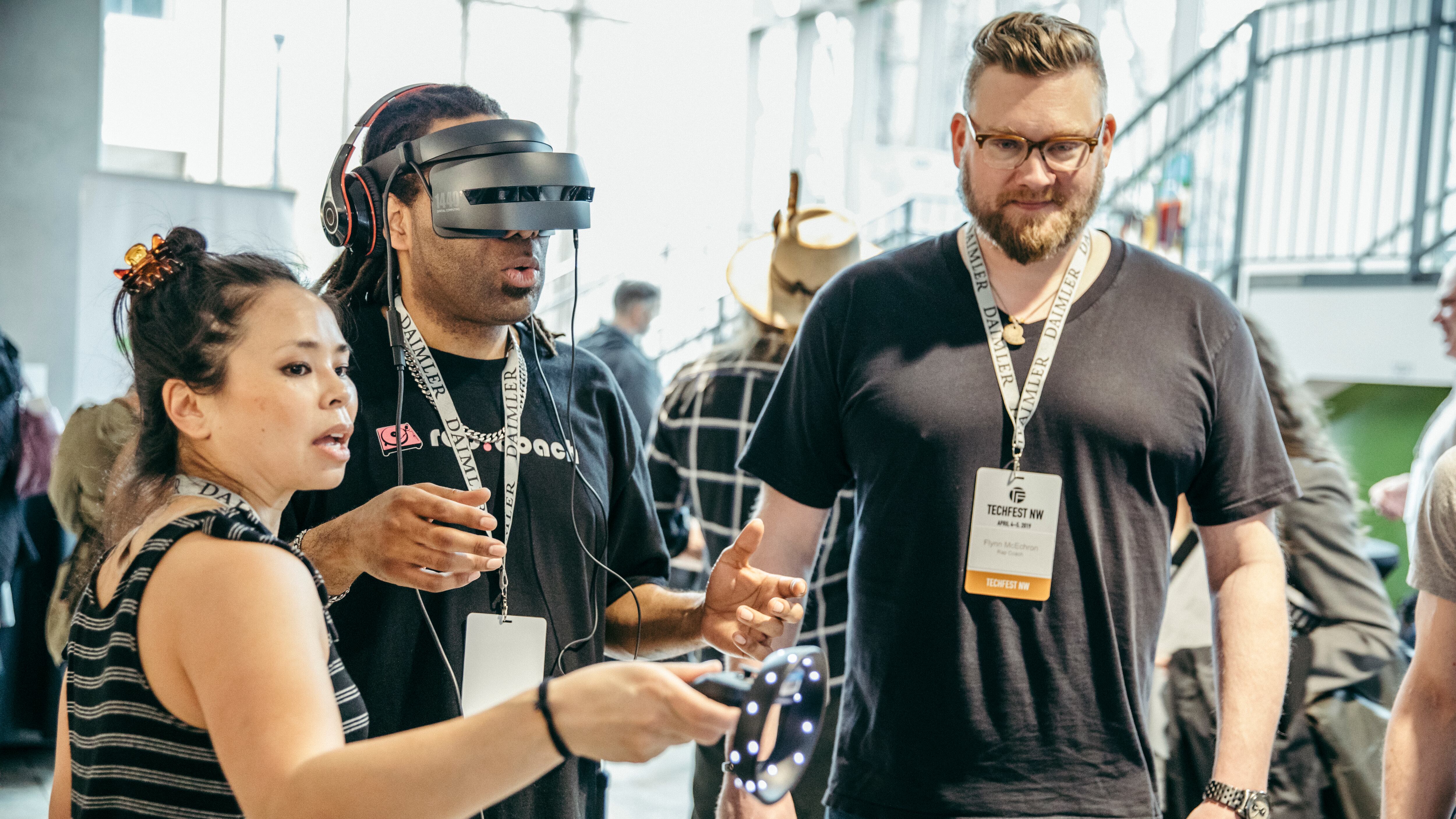What was the takeaway from the eighth annual TechfestNW and its largest-ever crop of 129 startups seeking prizes at PitchfestNW?
In a word: breathless. In two: tech business. In three: hard to understand. It was SaaSy (software as a service) and Fintechy (financial tech), with plenty of obfuscatory lingo.
In an effort to peek into a world that sometimes hides in plain sight, here are a few of the noteworthy or surprising words overheard at the event, starting with some quotes and phrases, and ending with nomenclature.
Quotes and Phrases
"The blockchain giveth, and the blockchain taketh away," said New York Times editorial board member Sara Jeong on the main stage. "There are features that are for you, and features that are going to fuck you."
"A great software coder is like a great musician—you'll never become great unless you jam," noted Jacob Hsu, CEO of Catalyte.
"Ten years ago I started my own company — right here in Beaverton, Oregon," said a company's pitcher, right here at the Portland State University Viking Pavilion in Portland. (The mistake indicates the outsized role Washington County plays in Oregon tech.)
"Everyone is trying to reimplement the bicycle," said another pitcher—a noticeable tech-friendly switchup for "reinvent." There were 7 startups and several speakers from other countries present, and one discussion was interrupted by several members of the audience who appeared to be protesting Israeli politics.
"Don't put wasps nests in your vagina," joked Dr. Jen Gunter during her main stage talk.
"Everyone's going to be wearing lightweight body suits in Arizona," noted former WW (and Wall Street Journal) reporter G. Pascal Zachary over Bach piano riffs, while envisioning the "robot-dominated," "post-survival" era of 2050.
"It's kind of bad-ass." One pitcher actually described his company this way.
"Press that button, those allies can come and record that interaction," said the pitcher for SafeSpace App, explaining that when a user hits the "S" on the app when pulled over by police, they summon others nearby to the scene.
"I have blockchain fatigue," said Allison Clift-Jennings, CEO of Filament, during her main stage talk about blockchain.
"Problems that are really discrete—those are going to be done by machines," Hsu said, speaking about how AI will impact work in the coming years.
"Apps today are designed for consumption, not creation," said the pitcher for PopSmartKids.
"Battery scientists are flying by the seats of their pants," said the EnergSoft pitcher, while displaying photos of flaming computers and planes.
"We have a social nudging effect," said the pitcher from Carbon Codex, which offers an "automatic personal emissions carbon tracking app."
"Women are out-adventuring men." said Sensi Graves, a professional kiteboarder, pitching "bikinis for girls who rip."

Lingo and Nomenclature
- Linesitters = people that wait in line at that fancy restaurant so you don’t have to, as overheard during the Saf App pitch. Yep, this is a thing now.
- ICO = “Initial Coin Offering,” like an Initial Public Offering for large firms, but for cryptocurrencies. “It’s where a company who wants to tokenize their product or service will actually create their own coin, and then sell that coin as well in an ICO,” says Clift-Jennings. “It’s often the basis for fraud.”
- Microtransactions = a way in which users, often in the gaming world, can purchase virtual goods with micropayments, overheard during Planet Nine’s pitch.
- The zebra startup = intends to be more ethical and inclusive, kind of like tech for good, the governing ethos for some tech citizens.
- Acronyms include MVP (minimum viable product), BTC (bitcoin), DLT (distributed ledger technology), AI (artificial intelligence), VR (virtual realty), AR (augmented reality), IoT (Internet of Things), and WWWD (What Would Warren [Buffett] Do?).
- Convenient conscious consumerism = overheard in Trestle, LLC’s pitch, it’s the idea that buying stuff can both be the right thing, and easy as hell.
- Digital citizenship = the idea that people using the web aren’t just hapless clickers waiting to get separated from dollars, digital currency, freedom or rights. “Apps today are designed for consumption, not creation,” noted the PopSmartKids pitch. Clift-Jennings says the concept is not dissimilar to self-sovereign identity. “The more time we spend as humans in the digital realm, having digital identity and what that should look like becomes important.”
- Validator parties = the people in the blockchain who make it “immutable”
- Scraping = harvesting data from websites, usually done by a bot, but one pitcher noted they “personally scraped 450 websites.”
- Hacking = as used by HealthSparq’s Anna Greene, who helped facilitate a hackathon called #WTFix-a-Thon, it’s “coming up with helpful solutions.” “It’s clever solutions to difficult [computer] problems,” Clift-Jennings says.
- SMS = short message service; good old fashioned text messages, still used across the world. As described by Adam Clayton Powell III, the president of the Public Diplomacy Council of the United States, they’re sent to cellular phones in Nairobi, across Africa and Asia via the iCow app, which lets farmers know how to find safe and verified agricultural content. Cellscope is a clip-on lens that turns a cell phone into a microscope. So of course the FDA won’t let us have it, Powell notes.
- Aesthetics of innovation = the bezels, the brushed steel, the beautiful pixels; why our iPhones give us a crink in our neck.
- Freemium = in Clift-Jennings’ words, “a business model in the tech world that gives away a lightweight part of the service for free, and then they get you hooked and charge you.”
- Cognitive agility = the ability of a person to “change your mind [when] presented with new facts, new data,” as Jacob Hsu explained. For anyone looking to not be replaced by AI.
- Relentless optimization = one of the things AI can offer, as heard during the Magalix pitch.

